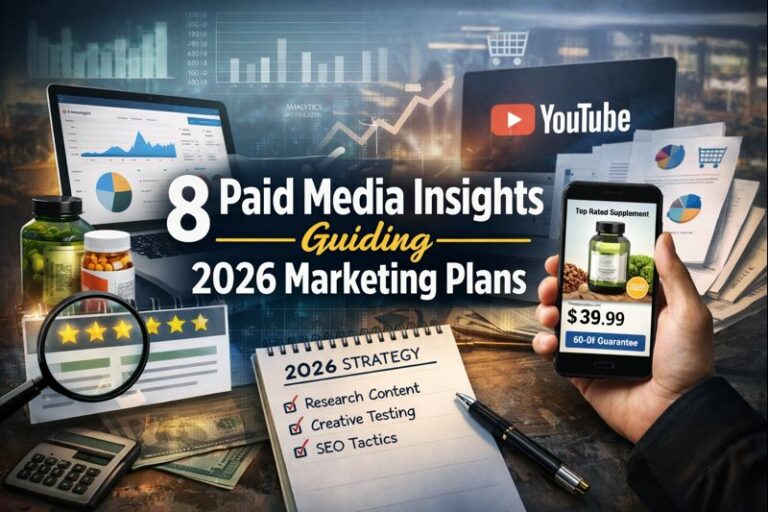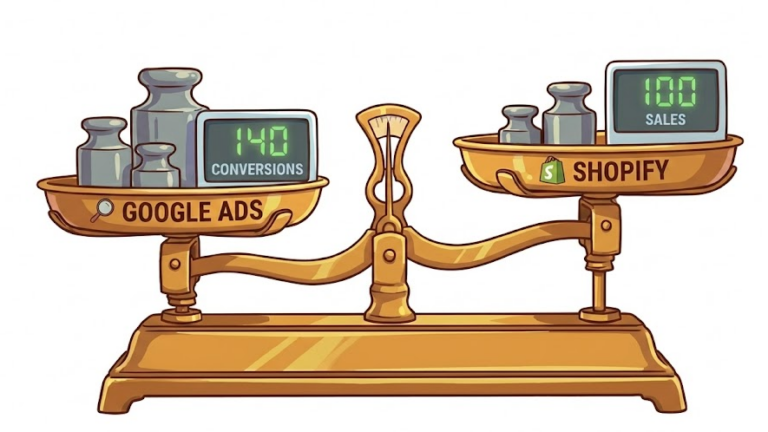Google just quietly rolled out a new metric inside Google Ads, and while it hasn’t been officially announced, it’s already live in some accounts. The new metric, “Conv. value (incl. predicted)”, layers machine learning predictions on top of actual conversion value. For brands running long-funnel or delayed-purchase campaigns, this changes the game. But the lack of transparency means marketers need to tread carefully.
Via Adriaan Dekker on LinkedIn
What’s New
Google is adding prediction-based metrics to the mix, and this one’s big. The new column gives you a clearer sense of future value, not just what you’ve earned so far.
- “Conv. value (incl. predicted)” merges real conversion value with an AI-generated estimate of near-future earnings.
- It’s already showing up as a column option in some accounts, even though Google hasn’t published formal documentation on it.
- Google’s machine learning models are using signals like user behavior, campaign settings, and conversion history to forecast results.
- It’s unclear how this is calculated or when a predicted conversion is considered “likely enough” to be included.
This is a huge step toward real-time predictive optimization, but it’s still a black box. Don’t rely on it blindly, but do start understanding what it’s telling you.
Why It Matters
If your campaign has a delayed purchase window or longer sales cycle, you already know the pain of waiting for clean results. This metric helps speed up decision-making by showing what’s likely coming down the pipeline.
- Use it to make earlier, smarter budget calls without needing to wait weeks for full data.
- This is especially valuable for lead-gen, subscription, or high-ticket brands with extended conversion timelines.
- It lets you identify which campaigns are building momentum, even if the sales haven’t landed yet.
- But it’s still just a prediction, so don’t use this as your final scorecard, treat it as an early signal.
At best, it gives you an edge by surfacing winners early. At worst, it gives you a little more to think about, but the insights could still be worth it.
DataPulse Already Solves This
If you’re one of our clients, you’re already ahead of this curve. Our in-house reporting platform, DataPulse, has been doing this longer, and more accurately.
- We model delayed revenue using your actual click-to-purchase timing from the past 12 months, not guesses.
- You can monitor inflation-adjusted values daily to see how much more value is coming in after a click.
- It’s all tied to real revenue, so you’re never guessing if predictions are inflated or grounded.
- Everything’s integrated into your regular dashboards, so there’s no need for additional setups or guesswork.
DataPulse makes sure your reporting reflects what’s actually happening and what’s still to come. The best part about it, you can sign up for free! Check it out, and see what you think!
What You Should Do Next
We’re not recommending a full strategy change just yet, but this metric is worth getting familiar with. Use it as a new layer of insight, especially for longer-funnel efforts.
- Turn on the “Conv. value (incl. predicted)” column in your Google Ads interface and start monitoring it.
- Track how it lines up against actual value over time to understand how well Google’s predictions hold up.
- Use it on delayed-conversion campaigns first, think lead-gen, gated content, or expensive products.
- Let it guide testing or prioritization, but don’t treat it as a definitive success metric yet.
This tool is early, imperfect, and potentially powerful. Learn it now so you’re ready to make the most of it later.
This update is just the start of a larger shift, where AI doesn’t just report performance, it tries to predict it. But the brands that win are the ones who know how to use data the right way. Don’t wait for official announcements or perfect documentation. Start learning now, testing smart, and using platforms like DataPulse to get even better insights.
Want help reading the signal through the noise? Let’s talk. Schedule a strategy session and we’ll show you exactly how to combine Google’s new metrics with real-world data to make sharper decisions, faster.






no replies